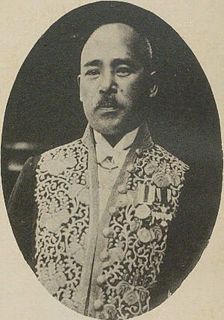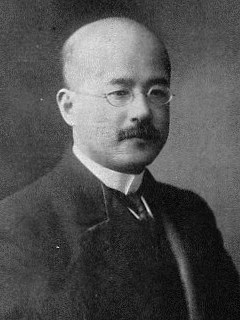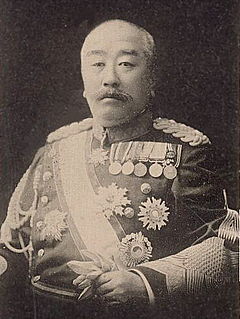 W
WFukushima Yasumasa was a general in the Imperial Japanese Army.
 W
WBaron Hayashi Gonsuke was a diplomat of the Empire of Japan.
 W
WHisao Hayashi was Governor of the South Seas Mandate (1933–1936). He was a graduate of the University of Tokyo. He was mayor of Kawagoe, Saitama. He was from Okayama Prefecture.
 W
WTakashi Hishikari was a general in the Imperial Japanese Army.
 W
WGeneral Baron Shigeru Honjō was a general in the Imperial Japanese Army during the early period of the Second Sino-Japanese War. He was considered an ardent follower of Sadao Araki's doctrines.
 W
WIjūin Hikokichi was a Japanese diplomat and politician who served as Minister of Foreign Affairs and Japanese Ambassador to Peking.
 W
WMasao Kishimoto was Director of the Karafuto Agency. He was Governor of Akita Prefecture (1922–1924), Yamagata Prefecture (1924), Okayama Prefecture (1927–1928) and Hiroshima (1928–1929).
 W
WCount Hideo Kodama , was a politician, and wartime cabinet minister in the Empire of Japan. He was the eldest son of famed Russo-Japanese War general Kodama Gentarō, and his wife was the daughter of Prime Minister Terauchi Masatake.
 W
WJirō Minami was a general in the Imperial Japanese Army and Governor-General of Korea between 1936 and 1942. He was convicted of war crimes and sentenced to life imprisonment.
 W
WGensui Baron Nobuyoshi Mutō was Commander of the Kwantung Army in 1933, Japanese ambassador to Manchukuo, and a field marshal in the Imperial Japanese Army.
 W
WViscount Ōshima Yoshimasa was a general in the early Imperial Japanese Army during the First Sino-Japanese War and the Russo-Japanese War. His great-great-grandson, Shinzō Abe was Prime Minister of Japan.
 W
WŌta Masahiro was the 14th Governor-General of Taiwan (1931–1932). He was Governor of Fukushima Prefecture (1913–1915), Ishikawa Prefecture (1915–1916), Kumamoto Prefecture (1916–1919), Niigata Prefecture (1919–1923) and Aichi Prefecture (1923–1924). He was a graduate of the University of Tokyo.
 W
WToshio Ōtsu was the last Director of the Karafuto Agency. After the end of his tenure, the Agency was abolished with the incorporation of Karafuto into the Soviet Union. He was Governor of Saitama Prefecture (1942–1943). He was a graduate of the University of Tokyo. After the defeat of the Empire of Japan in World War II, he was interned by the Soviet authorities.
 W
WKenkichi Ueda was a general in the Imperial Japanese Army during the Second Sino-Japanese War. He played an active role in the Soviet-Japanese Border Wars of the late 1930s.
 W
WYoshijirō Umezu was a Japanese general in World War II and Chief of the Army General Staff during the final years of the conflict. He was convicted of war crimes and sentenced to life imprisonment.
 W
WOtozō Yamada was a career officer and general in the Imperial Japanese Army, serving from the Russo-Japanese War to the end of World War II.
 W
WPrince Yamagata Isaburō was a Japanese politician, cabinet minister, and Japanese Inspector-General of Korea. His wife was the daughter of Katō Hiroyuki.